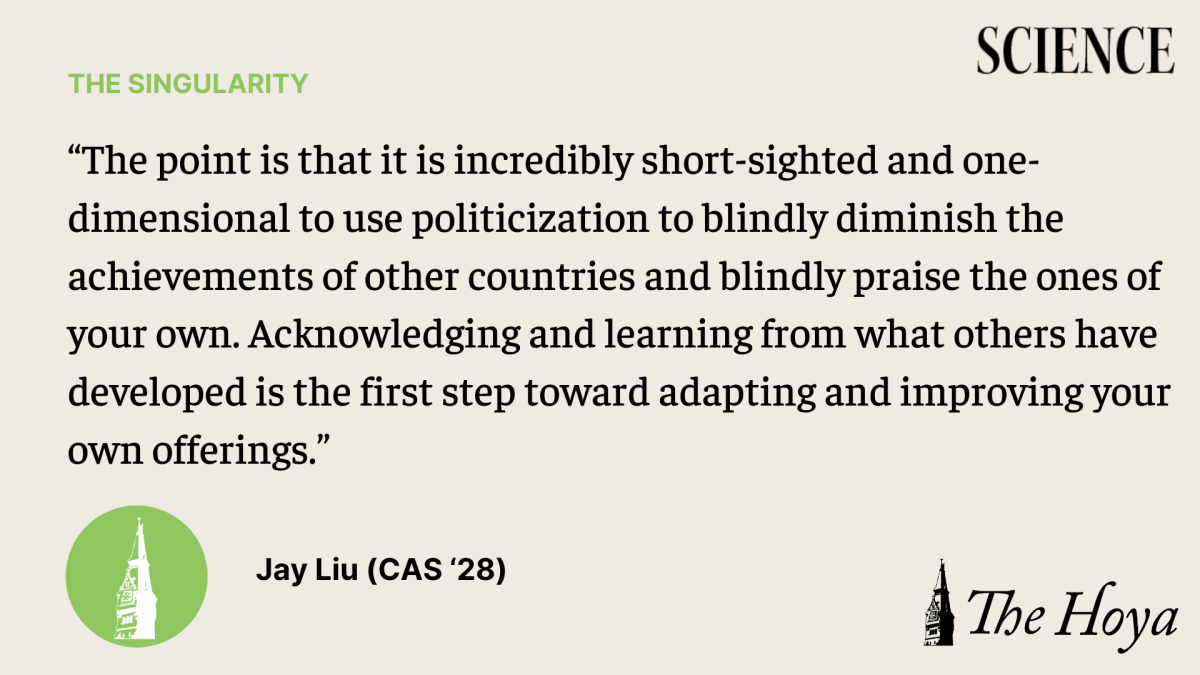
In this installment of his column "The Singularity," Jay Liu (CAS '28) stresses the significance of AI model DeepSeek amid international tensions in tech development, innovation and trade.
About a month ago, the world woke up to a shock. The release of the large language model DeepSeek R1, a chatbot with powerful reasoning capabilities, forced the tech world to reconsider its approach to artificial intelligence (AI) advancement altogether. DeepSeek — a subsidiary AI research company of a quantitative trading firm based in Hangzhou, China — caused losses in the stock market worth hundreds of billions for leading firms like OpenAI and Nvidia. Overnight, DeepSeek’s mobile app rose to the top spot in Apple’s App Store and stole the limelight in the AI field.
DeepSeek’s meteoric surge is controversial, to say the least. Its R1 model can allegedly match the performance of leading models like OpenAI’s o1 at a fraction of the costs. The R1 is a smaller reasoning model trained from DeepSeek’s V3, a larger general-purpose model comparable to OpenAI’s ChatGPT. The V3 reportedly cost less than $6 million to train (though the actual figure is heavily contested).
U.S. embargoes on advanced graphics processing units (GPUs) handicap AI firms based in China. GPUs were initially computer components designed for image processing on personal computers but have since then been used in cryptocurrency mining and AI development. Computing power is essential to model-training capabilities; more powerful and plentiful GPUs allow firms to train their models on more parameters, tuning them to produce more accurate and reliable answers. The fact that the R1 displayed comparable performances to leading models based in the United States, despite its purportedly low training costs and hardware limitations, was why the model sparked such strong reactions in the market and the media.
The AI arms race has become a crucial part of the United States’ foreign policy, especially with regard to China. The Stargate Project — a government-supported joint venture between OpenAI, Japan-based investment firm SoftBank and others that would invest more than $500 billion in AI infrastructure — makes clear the U.S. government’s great emphasis on AI competitiveness.
AI has become an irreplaceable way for many of us to interact with information. From misleading news to videos, AI’s capability to spread misinformation and disinformation poses potential threats to truth and democracy. AI could be used as a means of cognitive warfare, challenging users’ beliefs and making them question their values.
Many countries have already placed restrictions on DeepSeek’s models for this reason. Taiwan, whose sovereignty is the most immediately threatened by China, quickly banned using DeepSeek models on government devices. South Korea, Australia and some U.S. states have also restricted access to these models, citing similar concerns.
Anything related to China and technology has become a target for politicization. TikTok was the last example, and now it’s DeepSeek. Most of these precautions are sufficiently backed by evidence and well-grounded in national security concerns. At the same time, the politicization of such technologies has cultivated a strong anti-China sentiment that stands in the way of academic research progress and international collaboration.
In response to DeepSeek’s models, OpenAI accused the company of breaching its intellectual property via a training method known as distillation. Distillation is when a large general model, known as the teacher model, is “distilled” into a smaller, usually more specialized model. It’s a common technique used in model training to slim down large models and allow them to be run with fewer hardware requirements. OpenAI has stated that there is evidence to prove that DeepSeek distilled its models, but it hasn’t publicly released anything concrete.
However, the distillation controversy has been turned into an unproven, heavily politicized narrative. It feeds into other arguments, like suggesting that DeepSeek didn’t achieve anything remarkable or that it wouldn’t have existed without OpenAI. In reality, it has made breakthroughs in the mathematical and computational methods that optimize the AI training process, increasing its hardware and energy efficiency.
International tension easily creates false narratives that belittle and antagonize. Regulatory measures against the use of technology in cognitive warfare are, of course, required to defend countries’ democracy and sovereignty. However, the excessive politicization of technology impedes our understanding and continuation of AI progress and innovation.
Ironically, OpenAI is not open at all, while DeepSeek is open-source. It’s also interesting to consider the numerous lawsuits OpenAI is facing for breaches of intellectual property, only for it to accuse another company of the same.
The point is that it is incredibly short-sighted and one-dimensional to use politicization to blindly diminish the achievements of other countries and blindly praise the ones of your own. Acknowledging and learning from what others have developed is the first step toward adapting and improving your own offerings.